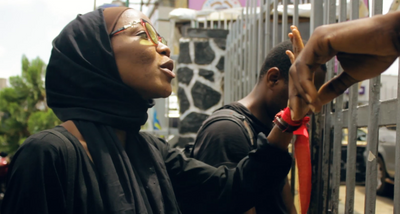'We Are Tired' Follows Peaceful Demonstrations Against Rising Rape Cases In Nigeria
This short documentary follows young people in Ibadan as they join nationwide demonstrations to demand action against an incessant record of horrific rape cases.
On the 27th May of this year, Vera Uwaila Omozuwa, a 22-year-old microbiology student at the University of Benin in Nigeria was gangraped and murdered in an empty church in Benin city. Widespread protests broke out across the country as this brutal crime opened up societal sores of the rampant and increasing cases of violence against women in the country, especially sexual violence and the state's apathy in ensuring justice is served. A few days later, 19 year old Barakat Bello a student of the Institute of Agriculture, Research and Training, Ibadan, was gang-raped and murdered in her home.
These and other gruesome injustices against women in Nigeria were the motivation behind a peaceful demonstration by youth in Ibadan demanding justice for the countless victims of rape and other acts of violence against women. Young filmmaker, Akinde Oluwatobi (Tobi), found out about the planned demonstrations on Twitter under the hashtag #WeAreTired and decided to film the protests.
In a conversation with OkayAfrica, Tobi discusses his short documentary, the larger context of this work and the importance of telling this story at this time.
What are the main events that unfolded at the demonstration that you captured in the film?
I saw the hashtag trending on twitter and decided I wanted to film the protests. I attended the demonstrations as a bystander and asked the protestors if it was fine for me to film them. They agreed. The demonstrations initially started on the streets then moved to a state-owned radio station. They were hoping to reach a larger audience with their message. As the group was still negotiating entry with the guards at the entrance, a young teenage hawker came to sell soft drinks to the group. One of the security guards slapped her telling her she had no right to be near the premises. The protestors demanded an apology from the management at the station for the incident. What this really showed though was how systematic and normalized violence against women in our society is. The guard clearly did not see the irony of him slapping the young girl at a protest demonstrating violence against women.
What was your inspiration for telling this story at this time?
The protests and ongoing discussions were quite timely. While the issue of sexual violence against women was the main motivation behind the protests, #wearetired has been used to highlight several other societal issues that are reaching a climax during this difficult time of COVID and resulting in the type of demonstrations that we are seeing. To contextualize the two major rape cases that inspired the protests, one has to also understand all the other ways that state brutality and complacency in the issue has led to this place. A few days after Uwa's murder, the national assembly approved an exorbitant amount of money to repair the national assembly while cutting down the education budget. COVID has adversely affected people's livelihoods, but at the same time the government has raised the price of fuel. Nigeria is now known as the poverty capital of the world, with more than 70% of its population living in poverty. Nigerians are tired for many reasons and this was one of the other major ways that they feel the state has failed its people.
Beyond that though, the protests are about holding the state accountable, but also highlighting the dysfunctional way that our society treats the issue of sexual violence against women. While the state does very little to bring perpetrators to justice, sometimes in society, rape is not really considered a crime, but more of a moral issue. Some families will try to find a way to amicably resolve the issue, thus further victimizing the survivors who can't even seek justice. The protests are about forcing our society to look at this ugly truths that it would much rather keep buried.
Who were the other contributors to the film?
There were excerpts from a poem by Ocean Young Celebrating Childhood and the jazz music was from taken from Gil Evans' Where Flamingos Fly. The poetry was read by Amaka Obioma.
Where can people find the film?
The film is available for free viewing on Vimeo.
Watch "We Are Tired" by Tobi Akinde below.
- Nigerians Rally Online to Demand Justice In the Rape of 23-Year ... ›
- Nigerian Women Have Taken to the Streets to March Against the ... ›
- Deeper Than The Headlines: Nigeria's Rape Culture, Mali, Non ... ›
- #JusticeForUwa, Nigerians Demand Answers for Student Killed in ... ›
- Nigeria Declares 'State of Emergency' on Rape - OkayAfrica ›
- A Visual Short Story of Gender-Based Violence and Femicide ›
- 'Stop Killing Us': A Visual Short Story of Gender-Based Violence and ... ›
- Nigerians on Twitter React to President Buhari Running For Re ... ›
- #WeAreTired: Nigerians Rally Online to Demand Justice for Victims ... ›
- #ShutItDown: Ongoing Namibian Protests Call for End to Gender-Based Violence - OkayAfrica ›
